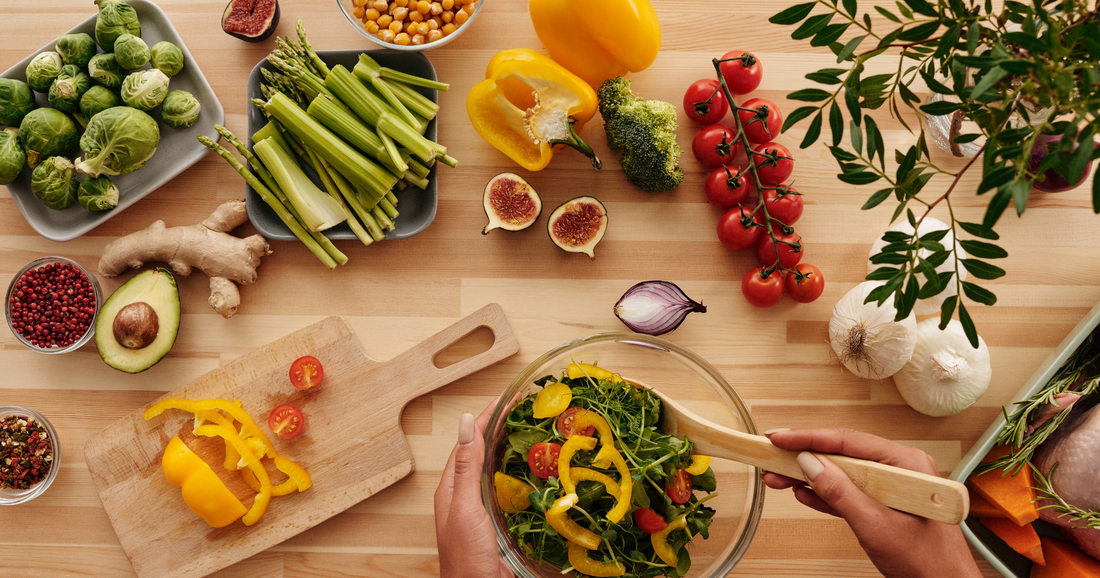
How To Manage Digestive Problems With Diet
Digestive problems such as IBS, bloating, acid reflux, constipation, diarrhoea, gallbladder issues, and food intolerances are common struggles that many people face daily. In this blog, we’ll explore why a healthy diet is the most important thing you can do to help yourself if you’re struggling with digestive problems, and offer practical guidelines for eating to support your gut health.
Why Diet Matters for Digestive Health
It might sound obvious but our digestive function is very connected to what we eat. An unhealthy diet, rich in processed foods, sugar, and artificial additives, can trigger or worsen digestive issues like bloating, acid reflux, and IBS. Conversely, a nutrient-dense diet with whole foods, healthy fats, and fibre can improve gut health, reduce inflammation, and restore balance to your digestive system. I’m not saying you need to eat well all the time, but if you can aim for eating well 80% of the time you will really notice the difference.
Eating real, whole foods rather than processed options is crucial for supporting your gut. Your body craves the essential nutrients found in natural foods to function effectively. Highly processed foods, on the other hand, are often low in nutrients and high in ingredients that can irritate your digestive system, leading to a range of issues.
Basic Guidelines for Eating for Digestive Health
1. Eat Food, Not Too Much, Mostly Plants
Focus on nutrient-dense whole foods like vegetables, fruits, nuts, seeds, and quality animal products. Avoid processed foods, refined sugars, and low-nutrient options, which can irritate the gut. Balance your plate with plenty of vegetables and moderate amounts of calorie-dense, nutrient-rich foods like meats and grains.
2. Choose Nutrients Over Calories
Nourish your body with real, whole foods like spinach, eggs, and grass-fed meat, which are rich in essential nutrients. Avoid synthetic or factory-produced foods that disrupt your body's natural balance.
3. Healthy Fats Are Essential
Incorporate fats like butter, coconut oil, and olive oil for cell repair and nutrient absorption. Choose raw fats, such as avocado or tahini, and avoid harmful trans fats and processed oils.
4. Limit Sugar and Processed Foods
Excess sugar strains the liver and gut, contributing to bloating and poor digestion. Stick to minimal fruit (two pieces per day) and avoid artificial sweeteners, opting for natural alternatives like stevia.
5. Fermented Foods and Raw Options
Support digestion with probiotics from fermented foods like yoghurt, kefir, and sauerkraut. Include raw foods (vegetables, olive oil, smoked salmon) to boost digestive enzymes.
6. Stay Hydrated
Drink plenty of water to aid digestion and prevent constipation. Herbal teas like ginger or peppermint are great for soothing digestive discomfort.
Finding Balance with Natural Solutions
Natural solutions that can help include dietary changes, and there are also herbal remedies, and lifestyle changes to consider.
Practical Tips for Eating Well
Shop the Perimeter: Stick to the outer aisles of the supermarket where fresh produce, meats, and dairy are usually found. Avoid the processed foods in the centre aisles.
Focus on Quality: Grass-fed meat, wild fish, and organic produce are more nutrient-dense and provide more nourishment for your body.
Avoid Canned Foods: The chemicals in cans, including BPA, can leach into food and disrupt digestion. Opt for glass or Tetra packs when possible.
Prepare in Advance: Meal prepping can ensure that you always have nourishing food on hand, helping you avoid the temptation of processed snacks or takeout.
Slow Down: Eating mindfully at the table, rather than in front of the TV or at your desk, helps support digestion and gives you a chance to truly enjoy your food.
Herbal Helpers for Digestive Health
Incorporating herbs into your diet can be an excellent natural support:
-
Alfalfa: Stimulates appetite and promotes healthy bowel movements by activating peristalsis.
-
Flax Seed: Provides omega-3 fatty acids and lignans that lubricate the bowel, aiding in constipation relief.
-
Fennel Seed: Reduces flatulence, indigestion, and bowel inflammation; supports IBS management.
-
Marshmallow Root: Soothes the digestive tract, alleviating gastritis, ulcers, colitis, and excessive stomach acid.
-
Lemon Balm: Eases indigestion, gas, and digestive issues linked to nervous tension; boosts bile production for better fat digestion.
-
Burdock Root: Rich in inulin, a prebiotic that nurtures beneficial gut flora, reduces inflammation, and enhances nutrient absorption.
Lifestyle Changes to Support Digestive Health
Practice Mindful Eating:
Chew your food thoroughly to make it easier for your digestive system to process. Focus on your meals by eating at a table without screens or multitasking. Stop when you are full. Overeating can strain your digestive system and lead to discomfort.
Stress Management:
Chronic stress disrupts the gut-brain axis, leading to symptoms like bloating, cramps, and IBS. Techniques such as mindfulness meditation, deep breathing, or yoga can help manage stress and improve digestion.
Sleep:
Poor sleep can negatively impact digestion and lead to symptoms like acid reflux. Aim for 7-8 hours of quality sleep per night and maintain a consistent sleep schedule.
Exercise:
Physical activity stimulates digestion by increasing blood flow to the gastrointestinal tract and promoting bowel regularity. Gentle activities like walking, yoga, or stretching can alleviate bloating and improve gut motility.
Environmental Toxins:
Minimise your exposure to environmental toxins, which can disrupt the gut biome. Use natural cleaning products, avoid plastic food storage, and filter your drinking water.
Takeaways
By making conscious dietary choices and respecting the natural balance your body craves, you can greatly improve your digestive health and overall well-being. Your digestive system will thank you:
- Better digestion and a reduction in digestive complaints is achievable with a holistic approach.
- Focus on eating real foods in their natural state and avoid having too many processed foods.
- Lifestyle changes, including mindful eating, stress reduction and reducing toxin exposure, are essential for supporting the digestive system.
